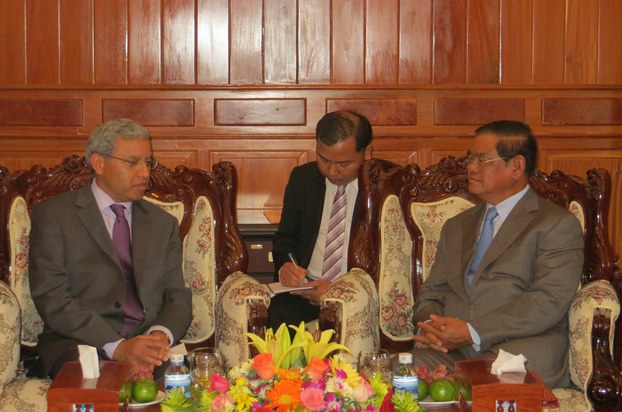




The Cambodian government will not reopen Freedom Park, which has been kept off limits to political gatherings most of this year, until protesters learn to “obey the law,” a spokesman for the Interior Minister said Friday, following talks with a U.N. human rights envoy pressing for democratic reforms.
“People have abused the park. If people obey the laws, we will reopen it,” spokesman Por Pheak told reporters in the capital Phnom Penh following talks between Interior Minister Sar Kheng and United Nations Special Rapporteur on the situation of human rights in Cambodia Surya Subedi, who is on a 10-day fact-finding mission to assess the government’s progress in improving human rights and democratic and land reforms.
It was not immediately clear whether Subedi raised the closure of Freedom Park during his meeting with the minister lasting about two hours.
Subedi’s last mission to Cambodia in January came just after security forces violently dispersed supporters of the the opposition Cambodia National Rescue Party (CNRP) from Freedom Park on Jan. 4 and closed the site, which has been the focus of protests against Prime Minister Hun Sen's rule following disputed July 2013 elections.
A day earlier, security forces opened fire in a Jan. 3 crackdown on opposition-supported strikes by garment workers demanding a higher minimum wage, leaving five people dead and scores wounded.
Freedom Park remains closed despite an announcement by Hun Sen in February that a ban on public protests had been lifted.
Last month, security forces violently dispersed a group of opposition supporters who had gathered outside Freedom Park in defiance of the ban on rallies in the Cambodian capital.
Issues discussed in the meeting between Subedi and Sar Kheng included forced evictions and the repatriation of Cambodian workers from Thailand, Por Pheak said.
“Sar Kheng said the government has provided transportation and food to help them return home,” he said.
Asked about the forced evictions of Cambodians from land acquired by developers, “the minister said the government is resolving this problem according to the law,” he said.
Sar Kheng also told Subedi that Cambodian authorities would not tolerate the practice of torture in detention, Por Pheak said.
Need for electoral reform
During his mission that began June 15, Subedi will have met with senior members of Prime Minister Hun Sen’s administration, as well as with representatives of civil society organizations, the business community, the U.N. country team, and international donors, a statement from his office said.
Subedi is scheduled to hold a press conference at the end of his visit on June 24 at the U.N. Human Rights Office in Phnom Penh.
In a separate two-hour meeting on Friday with deputy CNRP president Kem Sokha, Subedi discussed Cambodia’s political deadlock following elections which the opposition said was fraught with irregularities.
Cambodia’s National Election Committee (NEC) had declared Hun Sen’s Cambodian People’s Party (CPP) the winner with 68 seats in parliament to the CNRP’s 55.
CNRP lawmakers are currently boycotting parliament after their call for reelections were dismissed by Hun Sen.
“We discussed the political deadlock and talked about the CNRP’s and the CPP’s different proposals to reform the NEC,” Kem Sokha told RFA’s Khmer Service on Friday.
In recent talks to forge a political compromise, the CPP agreed to a CNRP proposal to make the NEC a constitutionally mandated body but refused the opposition party’s demand that the panel’s membership be endorsed by a two-thirds majority in parliament.
The CPP insisted that NEC members be approved by only an absolute majority, officials had said.
“Though Subedi said he hopes for land reform and for reforms in Cambodia’s judiciary and national assembly, I stressed that we must first reform the electoral process,” Kem Sokha said, adding that if the NEC is not reformed, the ruling party will continue to win elections.
Reported by Morm Moniroth for RFA’s Khmer Service. Translated by Samean Yun. Written in English by Richard Finney.